Declassified files show that the U.K. Foreign Office’s propaganda unit glossed over Washington’s complicity in civilian bloodshed during its devastating war in Vietnam, John McEvoy reports.
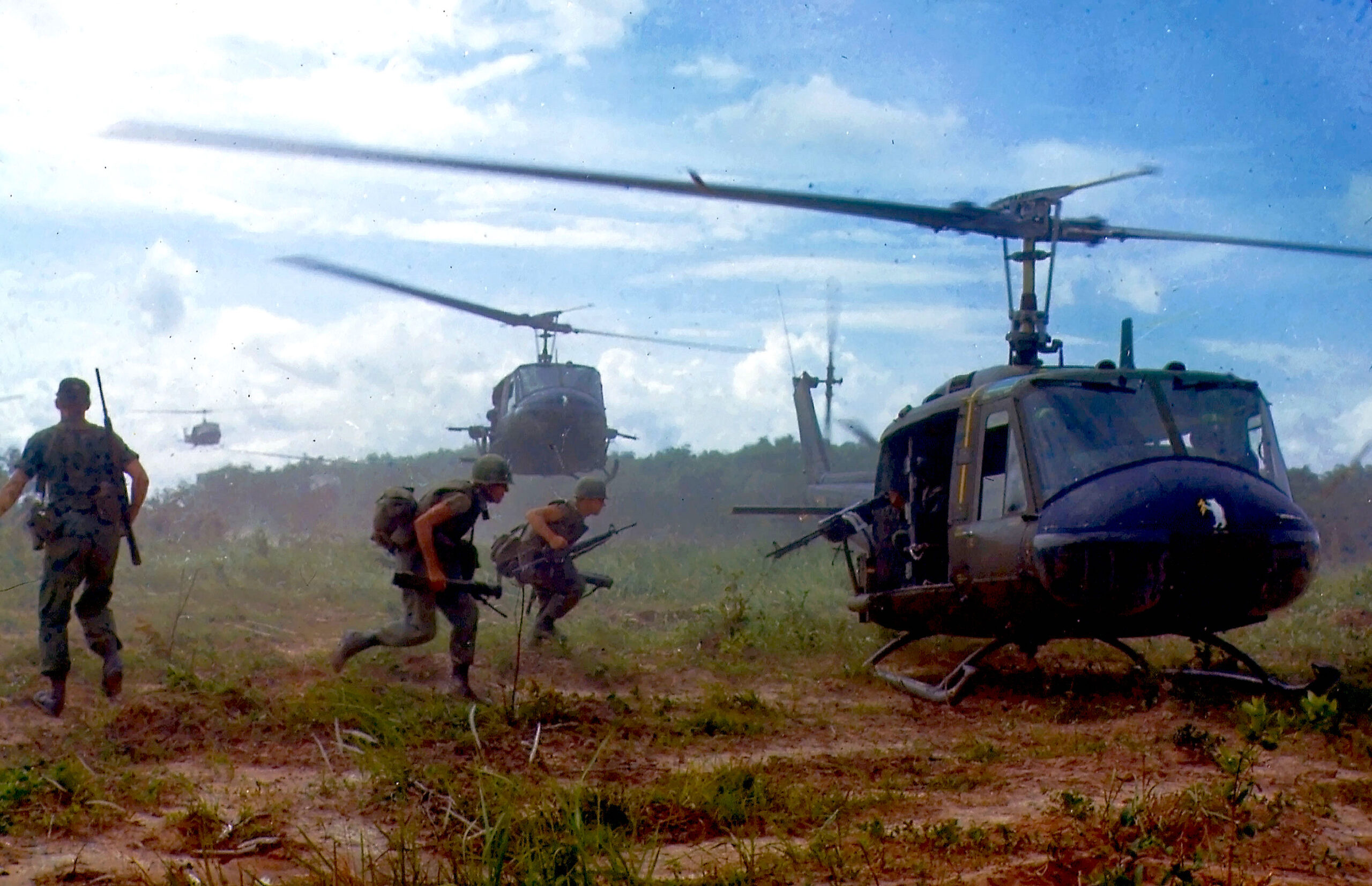
Helicopters airlift U.S. soldiers in Vietnam, 1966. (James K. F. Dung, Wikimedia Commons)
By John McEvoy
Declassified U.K.
- IRD operated in the U.K., sending material to dozens of British journalists and political figures to “support the U.S. cause”
- IRD sought to rehabilitate a Vietnamese Hitler admirer
- It offered “special” assistance to Washington over the infamous Gulf of Tonkin incident
- And it directly assisted South Vietnam’s regime, regarding it as an “emergency target”
 The British Foreign Office provided key propaganda support to the U.S. during its war in Vietnam, chiefly through its Cold War propaganda arm, the Information Research Department (IRD).
The British Foreign Office provided key propaganda support to the U.S. during its war in Vietnam, chiefly through its Cold War propaganda arm, the Information Research Department (IRD).
Throughout the 1960s, this support involved helping the U.S.-backed South Vietnamese regime to set up its own propaganda unit and whitewashing Washington’s image over civilian bloodshed.
It also entailed distributing material to hundreds of British political and media figures in order to sanitise U.S. atrocities and make the British public less critical of the war.
Remarkably, Britain even offered to provide the U.S. with “special” support during the infamous Gulf of Tonkin incident in 1964, which Washington used to cynically and dramatically escalate its war effort in Vietnam.
Britain was not only interested in currying favour in the so-called special relationship. Like the U.S., Britain wanted to contain a radical nationalist movement in Vietnam which threatened to set an example of successful independent development in South East Asia.
These documents demonstrate the lengths that Britain was prepared to go to support Washington’s war, which resulted in the deaths of 2-to-3 million people.
‘Emergency Target’
In September 1961, a British Advisory Mission (BRIAM) arrived in Saigon “to offer advice to the Vietnamese Government on how to go about the problem of destroying the Communist threat”.
A key pillar of British advice would be in the field of propaganda.
In December 1961, the British ambassador in Saigon judged that South Vietnamese ruler Ngo Dinh Diem needed to improve his unpopular regime’s “information services,” but democratic reform was out of the question.
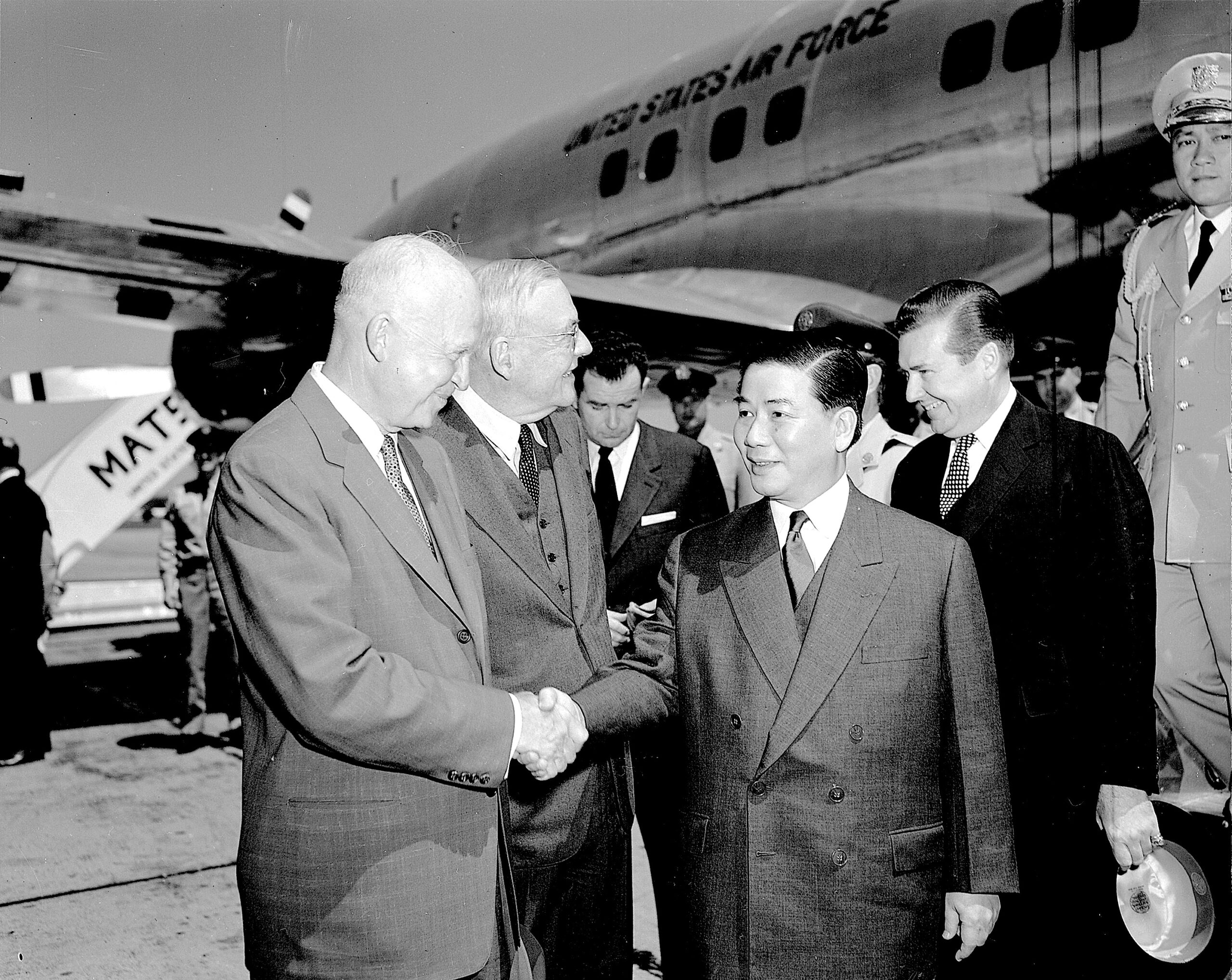
From left, U.S. President Dwight D. Eisenhower and Secretary of State John Foster Dulles greeting South Vietnamese President Ngo Dinh Diem at Washington National Airport, May 8,1957. (DoD, Public domain, Wikimedia Commons)
According to the head of BRIAM, Robert Thompson, “much was made of the fact that the administration was not democratic, but democracy does not work in all countries and could not do so in South Vietnam in the present circumstances”.
In other words, Washington’s puppet was unlikely to win a fair election and democracy thus had to be withheld.
“A key pillar of British advice would be in the field of propaganda”
As a result, the IRD’s output in Vietnam required “strengthening,” with one British embassy official in Saigon, the capital in the south, writing: “The fact is that Vietnam must now be regarded as an emergency target [for the IRD]”.
Britain’s initial propaganda objectives would be to “hit the peasant on the rice field,” to “help build loyalty among government officials by giving them good exposure,” and “to insure the population is informed of what is happening in Hanoi,” the capital of North Vietnam.
To this end, the Foreign Office embarked on helping the South Vietnamese regime “on the setting-up of a central office to study, analyse and expose Communist tactics” — a replica of Britain’s IRD.
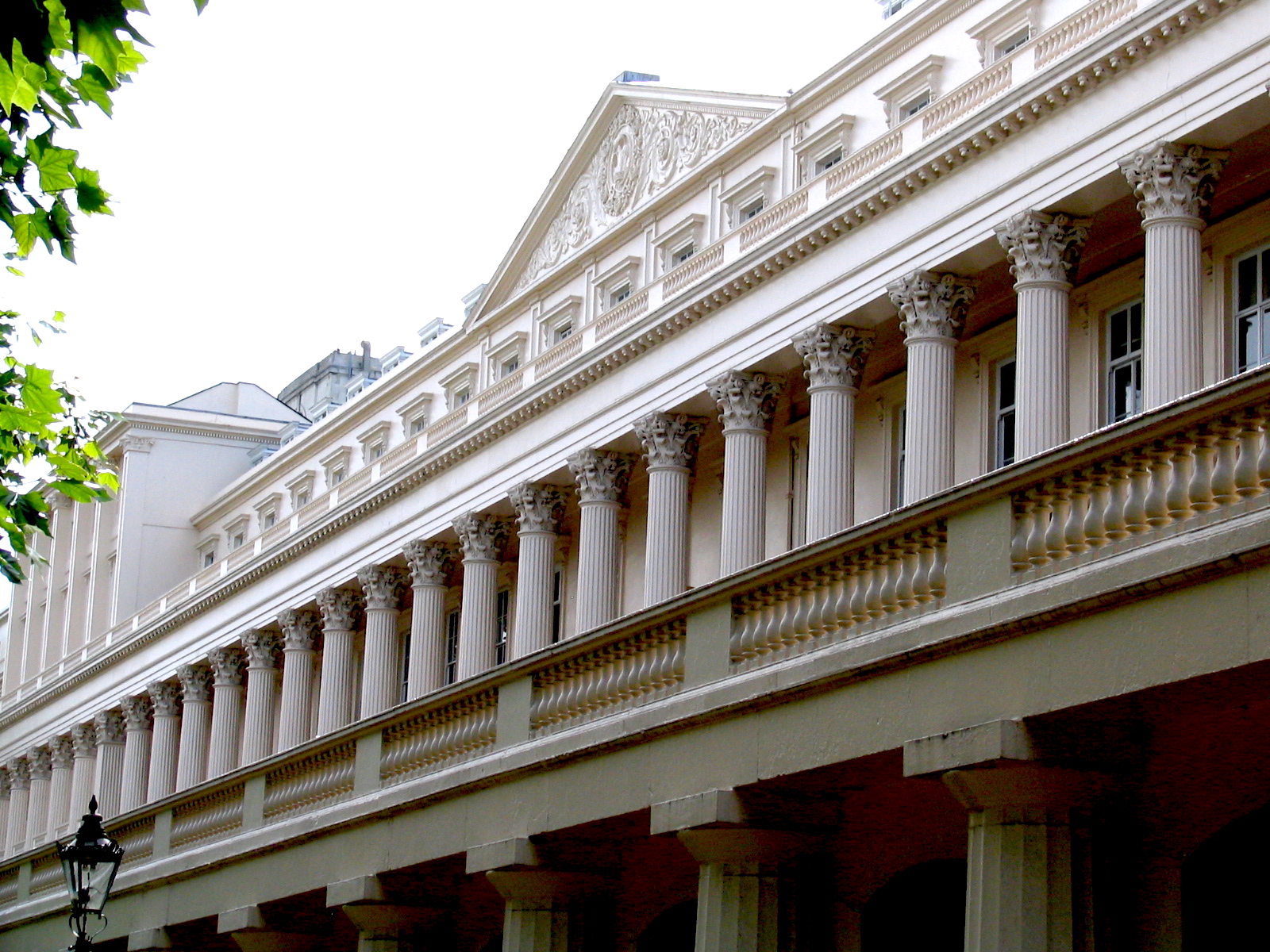
Terrace of London’s Carlton House, original home of the Information Research Department’s propaganda activities. (Suedwester93, Wikimedia Commons)
IRD chief Donald Hopson felt the idea of “helping the Vietnamese to set up their own IRD” struck “an encouraging note” and the Foreign Office thus “entirely approve[d] of the action.”
These discussions were followed by visits of South Vietnamese political figures to the IRD in London.
Rehabilitating Hitler-Enthusiast
After Diem was overthrown in a U.S.-sanctioned coup in November 1963, the IRD continued “advising the Vietnamese authorities on their counter-Communist activities.” It was also “briefing foreign correspondents and others on North Vietnamese and NFLSV [National Front for the Liberation of South Vietnam] affairs.”
By June 1965, a military officer named Nguyen Cao Ky had been installed as prime minister of South Vietnam. One month later, Ky told London’s Sunday Mirror: “People ask me who my heroes are. I have only one: Hitler.” He added that: “We need four or five Hitlers in Vietnam.”
Donate Today to CN’s
2022 Winter Fund Drive
Ky’s statement caused predictable controversy, and damaged the U.S.- and British-promoted narrative that the war in Vietnam was one of the “free world” pitted against totalitarianism. Calls were made in the U.K. Parliament to de-recognise the South Vietnamese government.
Bruised by the scandal, the British Foreign Office set about rehabilitating Ky’s Hitler-enthusiast image.
‘Four or Five Hitlers in Vietnam’
On Jan. 25, 1966, an IRD official wrote to the British embassy in Saigon that “we would welcome details of Viet Cong atrocities, and positive activities by the Americans – such as the provision of medical or educational facilities – and material to support a better projection of Ky than the traditional one of a pistol-packing Hitler worshipper”.
The official added: “I need hardly say that the closer we receive this material to the events the better, and items that have not been exploited by the Americans, if any exist, would be particularly useful”.
Herbert Lancashire, the first secretary at the British embassy in Saigon, responded that “we shall enquire … of Richard Morris, Diplomatic Correspondent of the Times who is due here for four days, whether his paper might accept a Man-in-the-News biography of Ky which might paint a different picture”.
Ultimately, the issue of Ky could not “be broached” in the meeting with Morris and Britain’s designs to rehabilitate a Hitler-enthusiast were apparently cut short.
‘Godsend’ to Washington
The IRD also directly assisted Washington’s propaganda campaigns. In the view of one Foreign Office official, “defeat for the Vietnamese and the Americans would be a disaster for the Free World and would not end here”. As such, Britain “must continue to give what help we can, as best we can”.
In April 1962, the IRD agreed to a request by the United States Information Service, which promoted government media operations, to produce “about fifteen 15-minute scripts depicting the impressions of a group of… refugees who left the North within the last twelve months”.
The idea was to present conditions in the communist North as far inferior to those in the South, and the scripts were handed over to South Vietnamese officers versed in psychological warfare.
Britain’s point man for this plan was Major Pham Xuan Ninh, the director of the National Radio in Saigon, who had already visited London for propaganda training in September 1961. The U.S. later told an IRD official that “the resources of your man in Saigon was a godsend”.
Gulf of Tonkin Incident
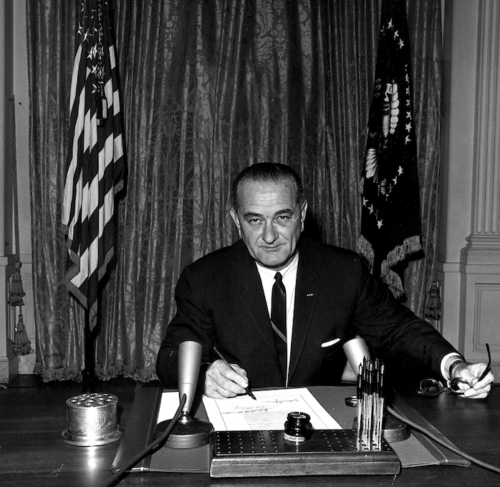
Aug. 10, 1964: President Lyndon B. Johnson signing the Gulf of Tonkin resolution. (Cecil W. Stoughton, U.S. National Archives and Records Administration, Wikimedia Commons)
On Aug. 2, 1964, the U.S.S Destroyer Maddox was attacked in the Gulf of Tonkin by North Vietnamese torpedo boats. Though the U.S. declared that the attack was unprovoked, it was in fact prompted by covert U.S. attacks on North Vietnamese forces.
Two days later, Washington claimed that U.S. ships had once again been attacked in the Gulf of Tonkin. This was a lie based on faulty intelligence, but it provided the U.S. with a useful justification to massively escalate the war.
On Aug. 10, U.S. President Lyndon B. Johnson acquired permission from Congress “to take any measures he believed were necessary to retaliate” against North Vietnam, forming the legal basis for Washington’s future prosecution of the war.
Remarkably, Britain offered to provide “special” assistance during the Gulf of Tonkin incident.
As one IRD official noted in secret correspondence, “at the beginning of the recent Gulf of Tonkin crisis I spoke to Mr. Wilt at the American Embassy and asked if there were anything special that we could do to help”.
Wilt was “very appreciative” of the offer but said that the U.S. government was at that time “very satisfied with the way that the story was playing itself”.
Improving Washington’s Blood-Stained Image
Over the following years, with the U.S. fully committed to the war, British propaganda assistance continued.
In 1966, as the U.S. conducted its Rolling Thunder operation — a massive and indiscriminate bombing campaign — Foreign Office notes show that IRD policy “was to help in improving the U.S. image over bloodshed”.
According to U.S. estimates, 182,000 North Vietnamese civilians were killed during Rolling Thunder, though the real figure is certainly much higher.
“Britain offered to provide ‘special’ assistance during the Gulf of Tonkin incident”
IRD officials justified this on the grounds that “there was no promise of a reasonable life for the people of South Viet-Nam if the Americans pulled out”.
Some years after the conclusion of the war, a former C.I.A. officer, Frank Snepp, admitted that when he would try to plant disinformation about Vietnam into the U.S. media, he would “go to the British ambassador and brief him on the disinformation I had just given a reporter. So when a reporter wanted to cross-check what I told him with… the British ambassador… he would get false confirmation – the same message coming back at him”.
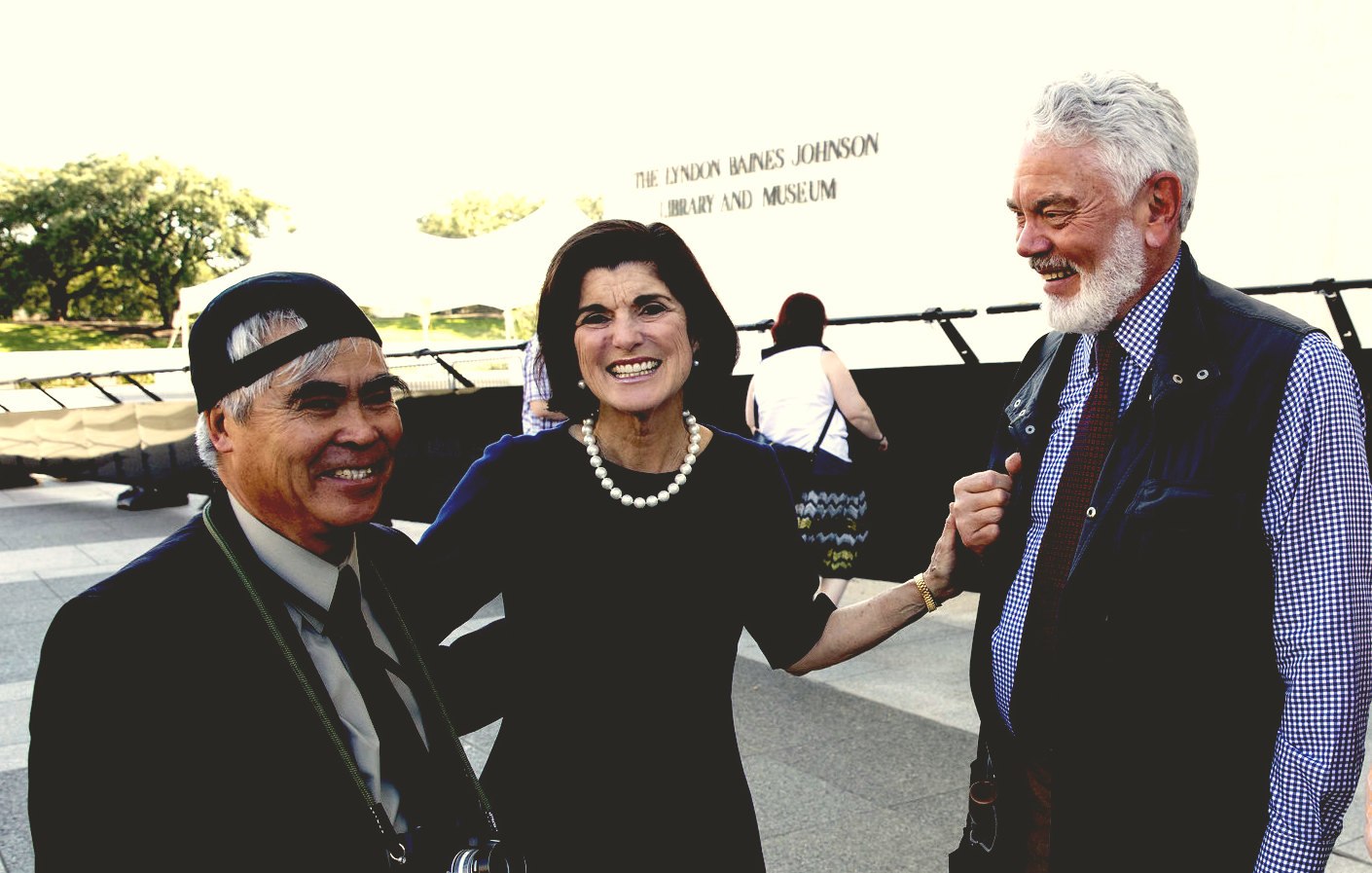
Frank Snepp at right, in 2016, at right, during a ceremony for Vietnam War veterans. On left, Pulitzer Prize-winning Associated Press photographer Nick Ut, whose coverage included a memorable photo of a South Vietnamese girl running after being burned by napalm. Luci Baines Johnson, daughter of President Lyndon Johnson, in center. (David Hume Kennerly/ LBJ Library, Public domain)
Propaganda at Home
Alongside supporting the South Vietnamese and U.S. propaganda effort, the IRD also went to considerable lengths to promote its material to the British public.
In the mid-1960s, it was noted with disappointment that “the Americans and South Vietnamese seemed to be getting a worse press in Britain than in most other Western countries”. The Americans were “losing sympathy” in Britain, one official added, and “some of the odium is rubbing off on HMG [the U.K. government]”.
To this end, a British embassy official in Saigon wrote that “a greater information effort at home in support of the Vietnamese/American war effort” would be appreciated. Proposals were invited for “possible ways of improving IRD output for home… consumption”.
By early 1966, the IRD had “increased its output and distribution on Vietnam… particularly in this country [Britain]”. Material devoted exclusively to Vietnam was being sent to over 250 contacts in Britain, including 61 MPs, 56 journalists and commentators, 13 members of the BBC and 22 academics.
“Material devoted exclusively to Vietnam was being sent to over 250 contacts in Britain”
Those newspapers most “receptive” to the material included The Daily Telegraph, Sunday Telegraph, Sunday Times, The Times, The Economist, and The Spectator.
This material was clearly aimed at shoring up the British public’s sympathy for the war effort, and shifting blame for the massive civilian casualties away from the U.S.
During this period, the IRD also sought to send delegations of British politicians and journalists to Vietnam, hoping that “the visitors would come back more convinced of the possibilities of victory, or at least of the need to contain communism, and therefore more inclined to support the U.S. cause”.
IRD material sent to Western Europe was also “regularly and effectively used”, while distribution in Latin America was described as “high because of the insatiable demand for anti-Communist material”.
British propaganda support during the war was considerable, but clearly not as effective as was desired — much of the British public remained bitterly opposed to the conflict, and the U.S. was eventually forced to make an embarrassing withdrawal from Vietnam in 1973.
John McEvoy is an independent journalist who has written for International History Review, The Canary, Tribune Magazine, Jacobin and Brasil Wire.
This article is from Declassified UK.
Donate Today to CN’s
2022 Winter Fund Drive
Donate securely by credit card or check by clicking the red button:


Interesting to see that the author has written for The Canary.
That publication, which likes to see itself as radical, and indeed is compared to the majority of the UK MSM, is currently pumping out anti-Iran articles which sound like they’ve been dictated by someone at the CIA.
“Listen up, Brits… the next ill-advised American-led adventureism you’ve been signed up for is…..”
“Some years after the conclusion of the war, a former C.I.A. officer, Frank Snepp, admitted that when he would try to plant disinformation about Vietnam into the U.S. media, he would ‘go to the British ambassador and brief him on the disinformation I had just given a reporter. So when a reporter wanted to cross-check what I told him with… the British ambassador… he would get false confirmation – the same message coming back at him’.”
In a nutshell, thus is one of the go-to techniques for misleading the public. Same during the WMD propaganda that was intended to shore up public support for the illegal invasion and occupation of Iraq that was intended to proceed to Iran, in 2003. And today, these same techniques as well as new and improved methods based on social media and a compliant mainstream media are fueling America’s manufactured war in Ukraine against Russia.
Regardless of the techniques employed, the point is always the same, the US, and other Western governments who wave the banner of democracy do not in any way work for the people of their countries. Research done, I believe, at Princeton University and published about a decade ago showed that the American public has exactly zero influence on America’s policies. This is called democracy? It has certainly not improved. Today it is orders of magnitude more rabid. The core activities of the US government in concert with its elite supporters is to concentrate wealth, away from the public and into elite hands, while supporting and fueling war and environmental destruction at home and abroad toward that end. That’s it.
Naturally, none of this benefits the public so what is left? The government cannot garner public support for policies intended to undermine it, the public, and siphon away its wealth. So what is left is to become masters of spin and propaganda. Multitudes of people in government and business are paid to think about exactly how to do this, 24/7. They are probably paid very well. The US government calls this democracy. But it is what it is, just a bait and switch in order to keep the party going. On the other hand, ore and more, the public simply accepts their “serf” status in this developing, or perhaps already developed, neo-feudal society based on neoliberal economics. Perhaps for many it is all they know.
Either this situation continues as it is until an opportunistic war like the one in Ukraine spins out of control, or catastrophic climate effects land, ending our specie’s reign on this planet. Or, perhaps there will be a “let them eat cake moment” where the public shakes off their blinders, determines to work together and perhaps salvages survival from the sinking ship that is humanity today.
I remember the tragedy that was Vietnam. For a while after that, we felt that we had thrown the bastards out. Finally, we though, America would live up to its promise to be a shining beacon of liberty and freedom. But that too was just a bait and switch because the greed and hatred these fascist or feudalistic elements harbor within them is utterly relentless and manic. Today it is at industrial-strength levels. In any case, the elements leading this lunatic plunge into the abyss will never, ever stop of their own accord. Either wrest the reigns from their malign hands or go over the edge with them. A fraught choice either way but if the people of these nations, especially the US, are unwilling to work for it, there is no choice at all.
It is no wonder that the US and the UK get along so well…birds of a feather…